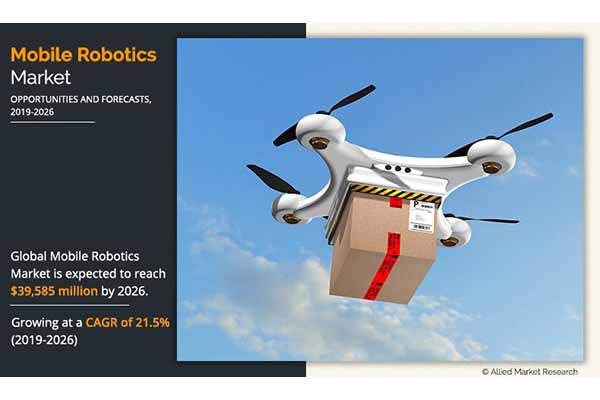Massive penetration of autonomous mobile robots in electronics, FMCGs, pharmaceuticals, warehousing, automotive, and healthcare sectors is expected to boost the growth of the global mobile robotics market. Surge in acceptance of mobile robots in various industrial and commercial sectors will prop up the global market trends. Additionally, escalating penetration of autonomous mobile robots in healthcare, automotive, material handling, and military & defense industries will expand the scope of market expansion. As per the Allied Market Research report, the global mobile robotics market is set to accumulate revenue worth nearly $14,492.1 million by 2026.
Key players in the global mobile robotics market are implementing strategies such as the launching of new products with additional features to enhance use of mobile robots in slew of sectors. Furthermore, the strategy will also help market players in accruing huge earnings along with expanding their business across the globe. Strategic partnerships are likely to assist the firms in expanding their line of business along with contributing sizably towards the product portfolio of the firms. These business strategies will help firms establish a marked presence in the global market and contribute notably towards the size of the market and also help the firms in product diversification. The strategies executed by the market players will enable the firms in increasing their consumer base and expand their regional presence across the globe. Let us discuss the strategies adopted by industry players to scale up their businesses and ongoing trends witnessed in the global mobile robotics market across the globe.
New product launches have played a pivotal role in leveraging the expansion of the global mobile robotics market and will continue to do so even in foreseeable future. For instance, Oceaneering International, Inc., a subsea engineering and applied technology firm based in the U.S., introduced new three mobile robots in North American market for expanding its autonomous mobile robotics product line. Reportedly, the new robot UniMover D 100, a tiny underride vehicle, is devised for transporting light weight goods such as boxes, trays, and totes. Apart from this, UniMover O 600 mobile robot is used for transport of bulk items including engineered components, medical devices, food products, pharmaceuticals, and packaged goods as well as laundry equipment. For the record, the MaxMover CB D 2000 mobile robot is launched with a purpose of accommodating huge loads such as automotive pallets, racks, and carts. The strategic move is aimed at expanding the consumer base as well as product portfolio of the firm. The initiative is likely to contribute majorly towards the size of the global mobile robotics market in the years ahead.
Continuing with the trend of new product launches, ANSCER Robotics, a Bangalore-based startup robotics firm, introduced a range of autonomous mobile robots referred to as AR 250, AR 1250, and AR 650 in India. Reportedly, the robots can be used for internal logistics in e-commerce industries. Apart from this, these mobile robots will help various businesses improve mobility in the indoor environment along with enhancing the ergonomics for the office staff. The aim of launching these automotive mobile robots was to enhance the operational efficiency of various businesses, reduce labor costs, effectively carry out repetitive tasks, and help organizations focus more on improving their core competencies. The move will boost the global market trends and contribute remarkably towards the global market revenue. In addition, Locus Robotics, an automotive mobile robot provider, launched two mobile robots, namely, Locus Vector and Locus Max. This has helped the firm expand its warehouse automotive mobile robot product line.
Strategic partnerships have majorly influenced the growth of every business and mobile robotics business is one of them. Reportedly, Addverb Technologies, a global robotics firm based in India, entered strategic partnership with Numina Group, a warehouse automation software developer and systems integrator. The move will help large number of warehouse owners in North America in replacing their conventional conveyor-based systems with autonomous mobile robots, thereby saving labor costs and enhancing operational efficiency of warehouse processes. Furthermore, Seegrid Corporation, a material handling equipment supplier based in the U.S., declared strategic partnership with RoBEX LLC, an automation machinery manufacturing firm and a system integrator with specialization in the industrial robots production. The collaboration will help RoBEX in introducing their customers to a complete Seegrid Palion autonomous mobile robot product portfolio. The strategic move will expand the scope of the growth of the Seegrid’s industrial robots business across the globe and will also contribute sizably towards the global mobile robotics market.
The key indusry players are implementing the business strategies such as new product launches and strategic partnerships with a view to increase their return on investments along with increase their market penetration. The objective of enforcing these strategies is to optimize gains of firms in terms of revenue, brand building, and brand imagery along with reinforcing strong positioning of their products.
About the author:
Dhananjay Punekar is writer, avid reader & book lover, and interested in watching sports. He holds post graduate degree in management and is working as a Sr. Specialist Content Writer at Allied Market Research. He can be reached at [email protected]















